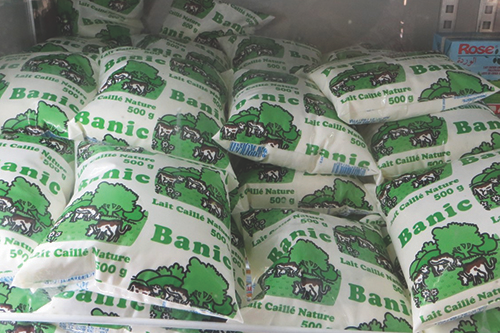Cooperation can lead to rewarding results at home and in unfamiliar settings, something Silvia Abel-Caines recently demonstrated while teaching women in a remote West African border town how to grow a business and become more food-secure.
A ruminant nutritionist with CROPP Cooperative, the co-op behind the consumer brand Organic Valley, Abel-Caines shared her story after a volunteer assignment organized by NCBA CLUSA’s USAID-funded Farmer-to-Farmer program. As a member of NCBA CLUSA, Organic Valley—along with the other organizations mentioned in this story—seeks to engage experienced, capable farmers like you to volunteer, teach and learn abroad. See our current Farmer-to-Farmer volunteer opportunities here.
Read Silvia’a story—first published in Organic Valley’s February 2018 Cooperative Forum—below.
I spent two weeks as a volunteer teaching milk processing techniques to the Dental Hayre women’s cooperative in the West African nation of Senegal. (“Dental” is the Senegalese word for “association.”)
The training was organized and funded by the National Cooperative Business Association CLUSA International (NCBA CLUSA) through its Farmer-to-Farmer program. It was an amazing experience! I met the group in the northwest region of Ourossogui, an eight-hour drive from Senegal’s capital Dakar. The dairy industry does not have strong government support in Senegal. Rural dairy farming is done mostly by women, and the cooperative I worked with has approximately 90 members. Their herds were a mix of sheep, goats and cows, with herd sizes ranging from 15 to 60 dairy animals.
These women came to the workshops every day after finishing their morning chores, some of them carrying their infants. They were eager to learn how to transform their milk into extended shelf-life products and sell them at the local market. I was amazed at their high entrepreneurial spirit and desire to improve their nutritional and economic status.
Local grocery stores sold imported milk and yogurt, but at prohibitive prices. The women’s interest was to produce a product that was nutritious and easy to make and sell with minimum investment.
A gallon of imported milk in Senegal costs around $6.62, or equal to three days’ wages. [photo: Organic Valley]When I was offered the opportunity to work with them, I immediately thought of making kefir. I brought a sample of a kefir culture from the Wisconsin farm of [Organic Valley] members Philip and Linda Johnson, who feed kefir to their calves. Transforming their milk into this highly nutritious probiotic drink was something completely new for these women, but they were eager to learn, taste and custom-flavor their kefir!
Some of the challenges I experienced were finding adequate glass containers to ferment the milk and teaching how to sanitize the milk collected from various households. I collected glass spaghetti sauce and fruit jelly jars, bought a water kettle and sterilized the utensils in my hotel room every day prior to class.
We also made butter and farmer cheese, which were a real treat to eat after the long hours in class. I taught them how to use milk for other purposes, including skin treatment and beauty products. They were very interested in learning how to make goat milk soap and also wanted to know how to make hard/aged cheese, which is a gourmet item in Senegal.
These women hope to market their kefir to surrounding villages and have a permanent presence at their weekly farmers market. The first item on their agenda after I left was to select a marketing saleswoman. I shared with them a picture of an Organic Valley milk carton, showcasing the picture of one of our farmer-members. They were thrilled to imagine their picture on the first Dental Hayre milk kefir container!
They are looking forward to continuing this project and welcome the opportunity to partner with other organizations to help them reach their dream to transform their milk into something nutritious and marketable.
The time I spent in rural Senegal was life-transforming. I saw with my own eyes the power of how small co-ops can enrich a community by providing food and additional income to people with little access to training due to gender, religion or education.



